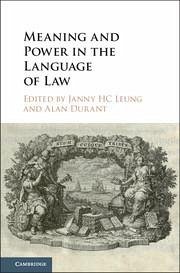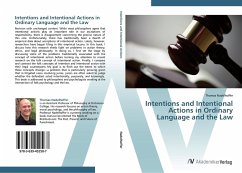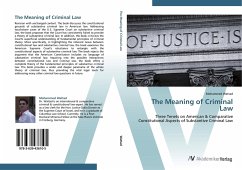Meaning and Power in the Language of Law
Herausgeber: Leung, Janny H C; Durant, Alan
Meaning and Power in the Language of Law
Herausgeber: Leung, Janny H C; Durant, Alan
- Gebundenes Buch
- Merkliste
- Auf die Merkliste
- Bewerten Bewerten
- Teilen
- Produkt teilen
- Produkterinnerung
- Produkterinnerung
A new perspective on how far law's power derives from socially situated communication rather than from abstract rules.
Andere Kunden interessierten sich auch für
![Intentions and Intentional Actions in Ordinary Language and the Law Intentions and Intentional Actions in Ordinary Language and the Law]() Thomas NadelhofferIntentions and Intentional Actions in Ordinary Language and the Law45,99 €
Thomas NadelhofferIntentions and Intentional Actions in Ordinary Language and the Law45,99 €![The Meaning of Criminal Law The Meaning of Criminal Law]() Mohammed WattadThe Meaning of Criminal Law52,99 €
Mohammed WattadThe Meaning of Criminal Law52,99 €![The Language of Jury Trial The Language of Jury Trial]() C. HefferThe Language of Jury Trial75,99 €
C. HefferThe Language of Jury Trial75,99 €![Charter of the French Language Charter of the French Language]() Charter of the French Language26,99 €
Charter of the French Language26,99 €![Privacy and the Press Privacy and the Press]() Joshua RozenbergPrivacy and the Press50,99 €
Joshua RozenbergPrivacy and the Press50,99 €![Language legislation in Belgium Language legislation in Belgium]() Language legislation in Belgium26,99 €
Language legislation in Belgium26,99 €![Language Rights of the Citizen of the European Union Language Rights of the Citizen of the European Union]() Aneta Skorupa-WulczynskaLanguage Rights of the Citizen of the European Union64,85 €
Aneta Skorupa-WulczynskaLanguage Rights of the Citizen of the European Union64,85 €-
-
-
A new perspective on how far law's power derives from socially situated communication rather than from abstract rules.
Hinweis: Dieser Artikel kann nur an eine deutsche Lieferadresse ausgeliefert werden.
Hinweis: Dieser Artikel kann nur an eine deutsche Lieferadresse ausgeliefert werden.
Produktdetails
- Produktdetails
- Verlag: Cambridge University Press
- Seitenzahl: 342
- Erscheinungstermin: 22. Februar 2018
- Englisch
- Abmessung: 235mm x 157mm x 20mm
- Gewicht: 667g
- ISBN-13: 9781107112841
- ISBN-10: 1107112842
- Artikelnr.: 48686178
- Herstellerkennzeichnung
- Libri GmbH
- Europaallee 1
- 36244 Bad Hersfeld
- gpsr@libri.de
- Verlag: Cambridge University Press
- Seitenzahl: 342
- Erscheinungstermin: 22. Februar 2018
- Englisch
- Abmessung: 235mm x 157mm x 20mm
- Gewicht: 667g
- ISBN-13: 9781107112841
- ISBN-10: 1107112842
- Artikelnr.: 48686178
- Herstellerkennzeichnung
- Libri GmbH
- Europaallee 1
- 36244 Bad Hersfeld
- gpsr@libri.de
Editors' Introduction Janny H. C. Leung and Alan Durant; Part I. Sui
generis or Socially Problematic: The Character of Legal Language: 1. The
unspoken language of the law Laura Nader; 2. Seeing sense: the complexity
of key words that tell us what law is Alan Durant; 3. Hiding in plain
sight: the category of ordinary language and the case law domain of
transgender marriage Christopher Hutton; Part II. Imperfect Fit between
Legal Categories and Social Discourse: 4. Effects of translation on the
invisible power wielded by language in the legal sphere: the case of Nepal
Katsuo Nawa; 5. The language of film and the representation of legal
subjectivity in Juno Mak's Rigor Mortis Marco Wan; Part III. Written in
Silence: Hidden Social Meanings in Legal Discourse: 6. Let the fingers do
the talking: language, gesture and power in closing argument Greg Matoesian
and Kristin Enola Gilbert; 7. Questions about questioning: courtroom
practice in China and the USA Meizhen Liao; 8. Law, language and community
sentiment: behind hate speech doctrine in India Siddharth Narrain; Part IV.
Conflict between Linguistic and Legal ideologies: 9. When voices fail to
carry: voice projection and the case of the 'dumb' jury Chris Heffer; 10.
Ideology and political meaning in legal translation Janny H. C. Leung; Part
V. Demands of Law and Limits of Language: 11. Law and the grammar of
judgment Janet Ainsworth; 12. Legal indeterminacy in the spoken word
Lawrence M. Solan and Silvia Dahmen; Afterword: 13. The said of the unsaid
Peter Goodrich.
generis or Socially Problematic: The Character of Legal Language: 1. The
unspoken language of the law Laura Nader; 2. Seeing sense: the complexity
of key words that tell us what law is Alan Durant; 3. Hiding in plain
sight: the category of ordinary language and the case law domain of
transgender marriage Christopher Hutton; Part II. Imperfect Fit between
Legal Categories and Social Discourse: 4. Effects of translation on the
invisible power wielded by language in the legal sphere: the case of Nepal
Katsuo Nawa; 5. The language of film and the representation of legal
subjectivity in Juno Mak's Rigor Mortis Marco Wan; Part III. Written in
Silence: Hidden Social Meanings in Legal Discourse: 6. Let the fingers do
the talking: language, gesture and power in closing argument Greg Matoesian
and Kristin Enola Gilbert; 7. Questions about questioning: courtroom
practice in China and the USA Meizhen Liao; 8. Law, language and community
sentiment: behind hate speech doctrine in India Siddharth Narrain; Part IV.
Conflict between Linguistic and Legal ideologies: 9. When voices fail to
carry: voice projection and the case of the 'dumb' jury Chris Heffer; 10.
Ideology and political meaning in legal translation Janny H. C. Leung; Part
V. Demands of Law and Limits of Language: 11. Law and the grammar of
judgment Janet Ainsworth; 12. Legal indeterminacy in the spoken word
Lawrence M. Solan and Silvia Dahmen; Afterword: 13. The said of the unsaid
Peter Goodrich.
Editors' Introduction Janny H. C. Leung and Alan Durant; Part I. Sui
generis or Socially Problematic: The Character of Legal Language: 1. The
unspoken language of the law Laura Nader; 2. Seeing sense: the complexity
of key words that tell us what law is Alan Durant; 3. Hiding in plain
sight: the category of ordinary language and the case law domain of
transgender marriage Christopher Hutton; Part II. Imperfect Fit between
Legal Categories and Social Discourse: 4. Effects of translation on the
invisible power wielded by language in the legal sphere: the case of Nepal
Katsuo Nawa; 5. The language of film and the representation of legal
subjectivity in Juno Mak's Rigor Mortis Marco Wan; Part III. Written in
Silence: Hidden Social Meanings in Legal Discourse: 6. Let the fingers do
the talking: language, gesture and power in closing argument Greg Matoesian
and Kristin Enola Gilbert; 7. Questions about questioning: courtroom
practice in China and the USA Meizhen Liao; 8. Law, language and community
sentiment: behind hate speech doctrine in India Siddharth Narrain; Part IV.
Conflict between Linguistic and Legal ideologies: 9. When voices fail to
carry: voice projection and the case of the 'dumb' jury Chris Heffer; 10.
Ideology and political meaning in legal translation Janny H. C. Leung; Part
V. Demands of Law and Limits of Language: 11. Law and the grammar of
judgment Janet Ainsworth; 12. Legal indeterminacy in the spoken word
Lawrence M. Solan and Silvia Dahmen; Afterword: 13. The said of the unsaid
Peter Goodrich.
generis or Socially Problematic: The Character of Legal Language: 1. The
unspoken language of the law Laura Nader; 2. Seeing sense: the complexity
of key words that tell us what law is Alan Durant; 3. Hiding in plain
sight: the category of ordinary language and the case law domain of
transgender marriage Christopher Hutton; Part II. Imperfect Fit between
Legal Categories and Social Discourse: 4. Effects of translation on the
invisible power wielded by language in the legal sphere: the case of Nepal
Katsuo Nawa; 5. The language of film and the representation of legal
subjectivity in Juno Mak's Rigor Mortis Marco Wan; Part III. Written in
Silence: Hidden Social Meanings in Legal Discourse: 6. Let the fingers do
the talking: language, gesture and power in closing argument Greg Matoesian
and Kristin Enola Gilbert; 7. Questions about questioning: courtroom
practice in China and the USA Meizhen Liao; 8. Law, language and community
sentiment: behind hate speech doctrine in India Siddharth Narrain; Part IV.
Conflict between Linguistic and Legal ideologies: 9. When voices fail to
carry: voice projection and the case of the 'dumb' jury Chris Heffer; 10.
Ideology and political meaning in legal translation Janny H. C. Leung; Part
V. Demands of Law and Limits of Language: 11. Law and the grammar of
judgment Janet Ainsworth; 12. Legal indeterminacy in the spoken word
Lawrence M. Solan and Silvia Dahmen; Afterword: 13. The said of the unsaid
Peter Goodrich.








